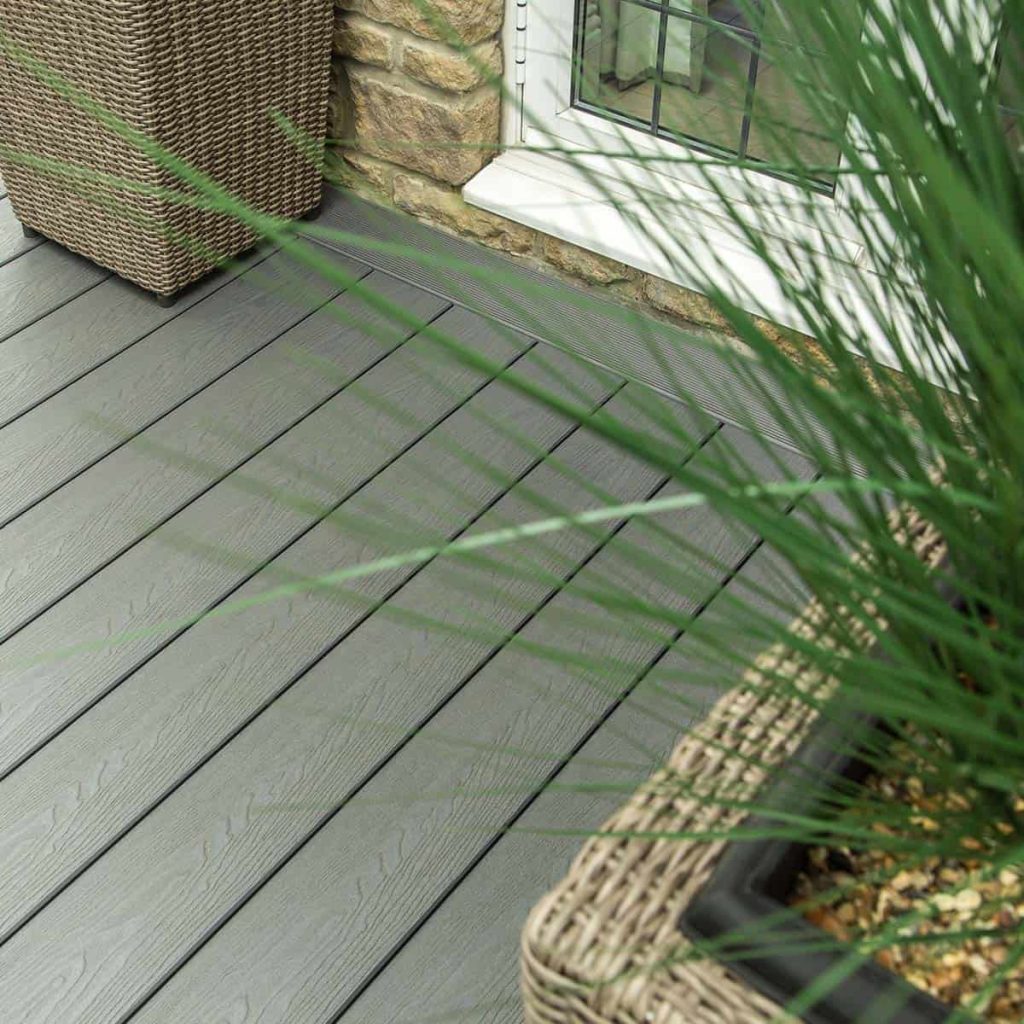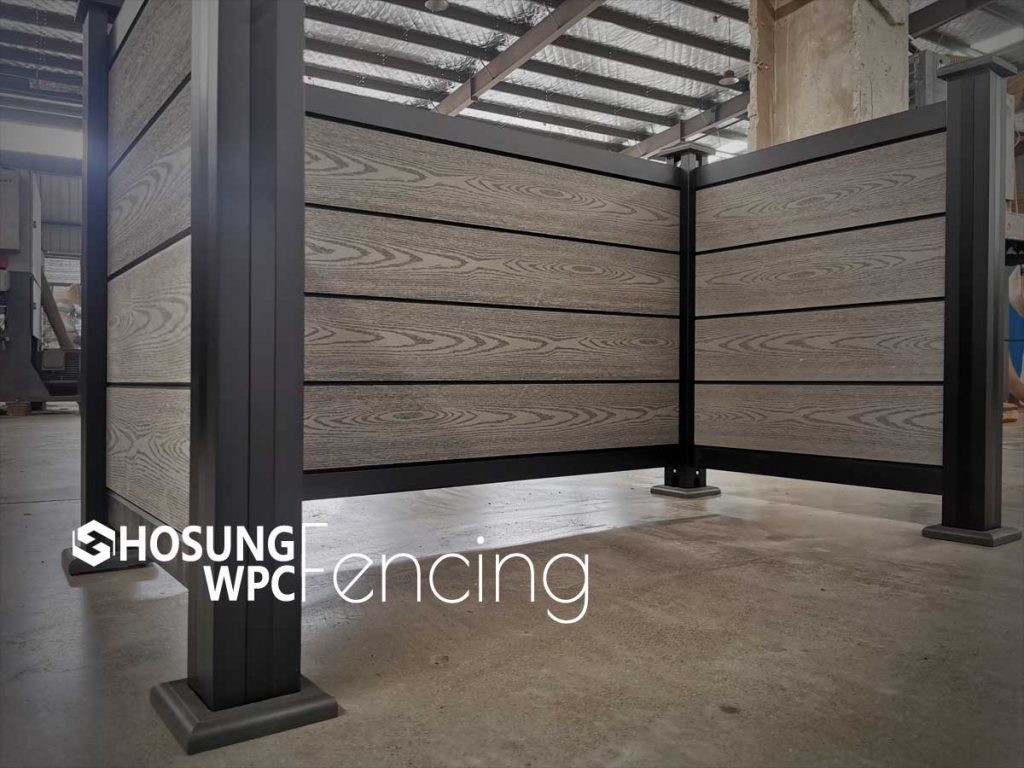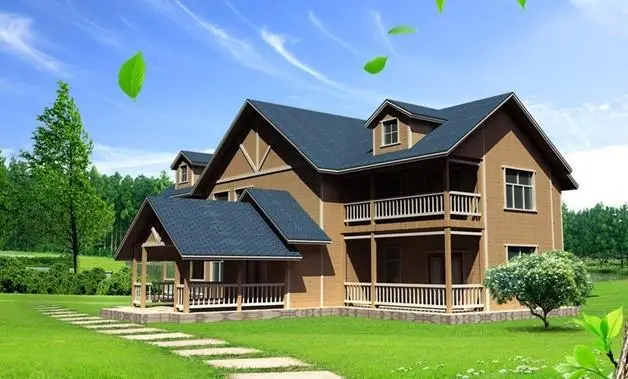Composite decking continues to evolve in design, texture, and color, and one of the most striking and increasingly popular tones is dark green composite decking. Offering a unique blend of modern elegance and a natural forest-inspired hue, this decking option is ideal for homeowners and designers who want to integrate outdoor structures seamlessly into garden landscapes or wooded backyards.
Table of Contents
In this article, we will explore the unique benefits, applications, style inspiration, and key buying considerations for dark green composite decking. Whether you’re planning a peaceful garden retreat, a lush rooftop oasis, or a vibrant outdoor entertainment area, this distinctive decking color can deliver both visual impact and practical performance.
Why Choose Dark Green Composite Decking?
Dark green isn’t just an aesthetic choice—it’s also a strategic one. Unlike more common decking shades like grey, brown, or redwood, dark green decking blends beautifully with natural surroundings. It evokes the feel of deep forest foliage, moss-covered stones, or lush landscapes, making it ideal for those seeking a more organic, cohesive look in their outdoor space.
Key Benefits:
Natural Camouflage: Ideal for gardens, wooded areas, and eco-retreats.
Modern Appeal: Dark tones are on-trend and work well with minimalist or contemporary architecture.
Stain and Fade Resistance: Most composite materials retain color better than stained wood.
Low Maintenance: No painting, staining, or sealing required.
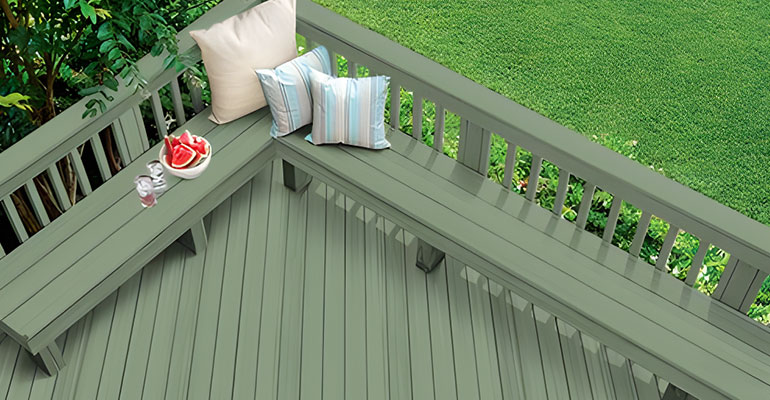
Performance Comparison: Composite vs. Wood Decking
Choosing the right material for your deck is just as important as selecting the color. Below is a quick comparison between composite decking (with a focus on dark green tones) and traditional pressure-treated wood decking:
Table 1: Composite vs Wood Decking Comparison
| Feature | Dark Green Composite Decking | Traditional Wood Decking |
|---|---|---|
| Color Retention | Excellent, UV-resistant pigments | Fades quickly without sealing |
| Maintenance | Very low (soap & water clean) | High (requires staining, sealing) |
| Durability | 25+ years, resistant to rot | 10–15 years, prone to warping |
| Eco-Friendliness | Often made from recycled plastics | Requires tree harvesting |
| Slip Resistance | Textured surfaces, safer when wet | Can be slippery when wet |
Dark green composite decking outperforms traditional wood in most categories, particularly in long-term value and environmental impact.
Design Inspiration and Outdoor Applications
Dark green is an exceptionally versatile decking color. It can take on earthy, dramatic, or luxurious qualities depending on how it’s styled. Here are some real-world applications and ideas to inspire your project.
a. Garden Pathways and Terraces
Imagine a shaded garden with winding paths made of dark green decking boards, surrounded by ferns, tall grasses, and stone accents. The decking becomes part of the garden itself—quiet, unobtrusive, yet striking.
b. Poolside Platforms
If you’re looking to create a cool, tropical vibe around a pool or hot tub, dark green tones pair beautifully with water elements and bright cushions. Add white or light grey furniture for contrast.
c. Rooftop or Urban Oasis
Even in urban areas, this decking color can evoke nature. Combine it with potted evergreens, climbing vines, and wooden pergolas for a secluded, spa-like retreat.
d. Rustic Retreats and Cabins
Dark green composite decking enhances log homes, cabins, or cottages in mountainous or forested areas. It blends with pine trees, rocks, and wood exteriors for a harmonious outdoor space.
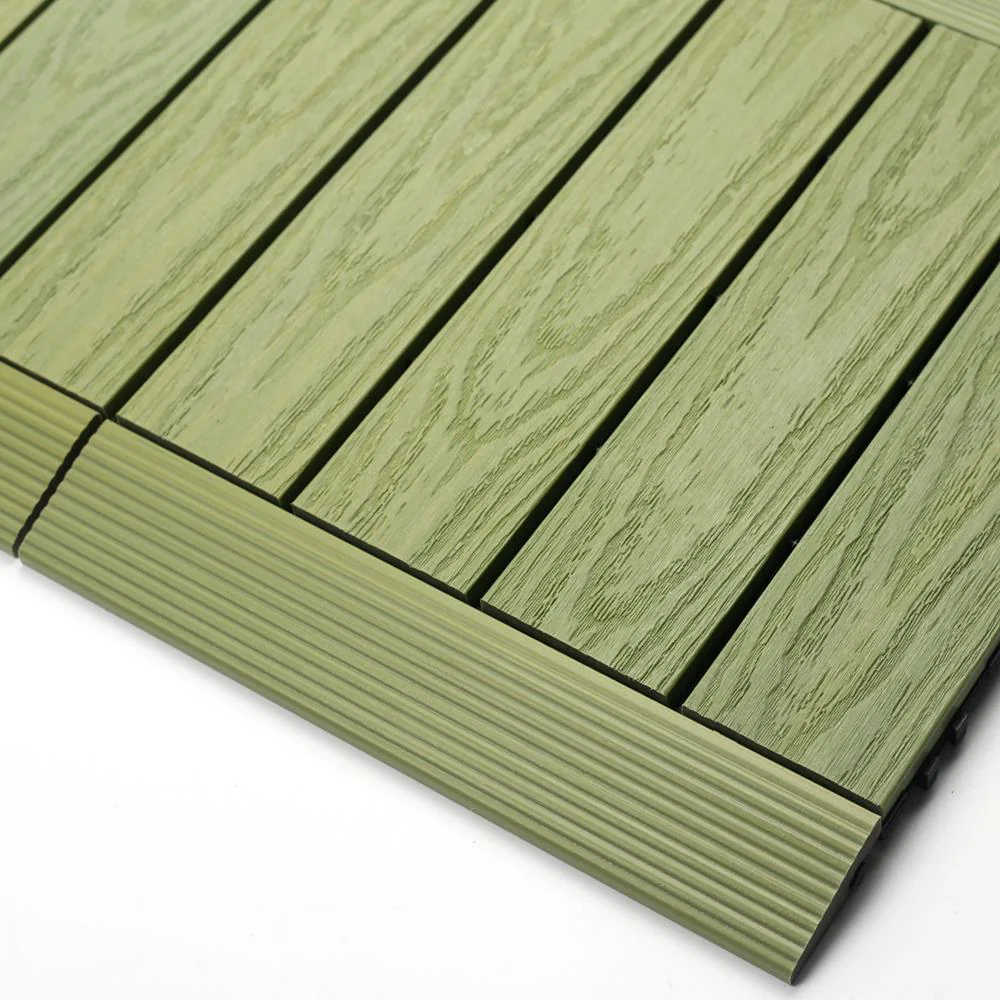
Dark Green Composite Decking vs Other Popular Colors
When choosing the right color for your outdoor decking, aesthetics, functionality, and environmental integration all come into play. While classic tones like grey, brown, and black are widely used, dark green composite decking brings a refreshing, nature-driven aesthetic that few other colors can match.
Dark green blends effortlessly into lush garden environments, tree-heavy landscapes, and properties surrounded by nature. Unlike grey decking, which offers a cool, modern tone suited for urban homes or minimalist designs, dark green exudes warmth and earthiness, making it ideal for rustic or countryside settings. Compared to traditional brown decking, which mimics wood grain, dark green feels more organic and less expected—giving your outdoor space a distinctive, elegant edge. It doesn’t try to imitate timber but celebrates its own identity.
Black composite decking, while bold and contemporary, can get excessively hot under sunlight and tends to highlight dust, scratches, or fallen leaves more easily. In contrast, dark green offers better visual forgiveness, hiding minor imperfections and dirt naturally thanks to its muted depth of tone.
Here’s a visual comparison to help highlight the differences:
| Color | Visual Impact | Heat Absorption | Maintenance Ease | Best Use Scenario |
|---|---|---|---|---|
| Dark Green | Natural, earthy, blends with foliage | Moderate | High (hides dirt and stains well) | Gardens, woodland surroundings, shaded patios |
| Grey | Modern, minimalist | Low | Moderate (shows dust) | Urban homes, modern architecture |
| Brown | Classic wood-like appeal | Moderate | Moderate | Traditional decks, timber-look settings |
| Black | Sleek, dramatic | High | Low (shows scratches and dirt easily) | Modern luxury decks, night lighting schemes |
All in all, if you want a decking color that supports a garden’s visual harmony, reduces visible maintenance needs, and remains comfortably cool in many climates, dark green composite decking is a superior choice. It’s not only beautiful but also practical—an ideal option for homeowners who want long-lasting, low-fuss elegance in their outdoor space.
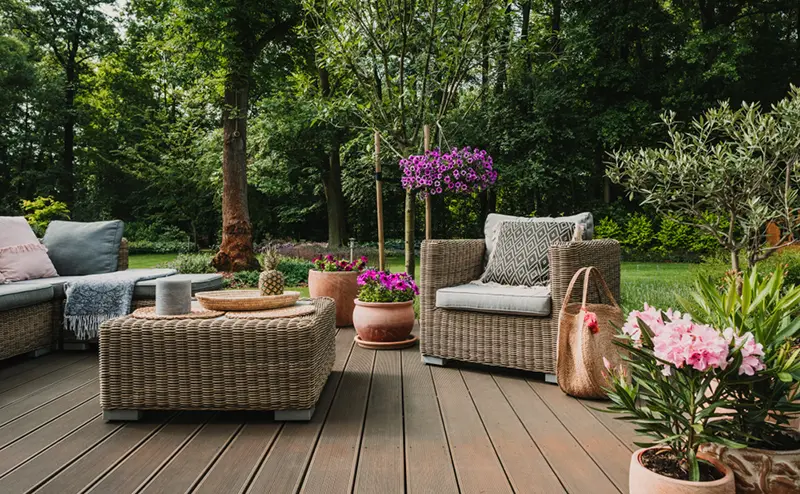
Choosing the Right Product: Texture, Profile & Warranty
Not all composite decking boards are created equal. When selecting a product in dark green, consider the following:
a. Texture and Surface Finish
Look for boards that feature woodgrain embossing or deep ridges. These provide better traction and a more natural appearance, especially when viewed in sunlight or rain.
b. Board Profile
Composite decking is typically available in solid or hollow profiles. Solid-core boards are denser and more durable, while hollow-core boards are lighter and cost-effective.
c. Edge Style
Choose from square-edged, grooved-edge, or scalloped-edge boards based on how you plan to fasten them.
d. Warranty
Opt for brands offering at least 20-25 years of warranty, with coverage for fading and staining. Quality dark green composite decking should retain its rich color for years.
Table 2: Product Selection Guide
| Feature | Recommended Spec |
|---|---|
| Color | Deep forest green or moss green |
| Profile | Solid core |
| Texture | Embossed woodgrain or ridged |
| Fastening | Hidden clips for clean finish |
| Warranty | 25 years fade & stain warranty |
Installation and Maintenance Tips
Though composite decking is known for being easy to install and maintain, there are a few tips to maximize the performance and appearance of your deck—especially with darker colors.
a. Installation Best Practices
Allow for Expansion: Composite boards expand slightly with temperature; use recommended spacing.
Hidden Fasteners: Ideal for grooved boards and give a seamless look.
Joist Placement: Follow manufacturer guidelines (usually 12″ or 16″ centers).
b. Maintenance Guidelines
Routine Cleaning: Use a mild soap and water solution with a soft brush.
Avoid Pressure Washing: High-pressure nozzles may damage textured surfaces.
Mold Prevention: Ensure proper drainage and avoid placing planters directly on boards.
c. Seasonal Care
In shaded or damp areas, especially where greenery thrives, leaves and debris can build up. Sweep regularly and rinse in the spring and autumn to prevent mildew.
Sustainability and Eco-Friendly Considerations
Homeowners are becoming more conscious of sustainability when choosing building materials. One of the key advantages of dark green composite decking is that it aligns with environmentally responsible construction practices.
Eco-Benefits:
Recycled Materials: Many boards are made from recycled plastics and reclaimed wood fibers.
No Harmful Chemicals: Unlike pressure-treated wood, composite materials don’t contain arsenic or formaldehyde.
Long Life Span: Reduces the need for frequent replacement, lowering material waste over time.
Choosing composite over tropical hardwoods also helps reduce global deforestation. For added assurance, look for certifications such as FSC (Forest Stewardship Council) or LEED-compliant products.
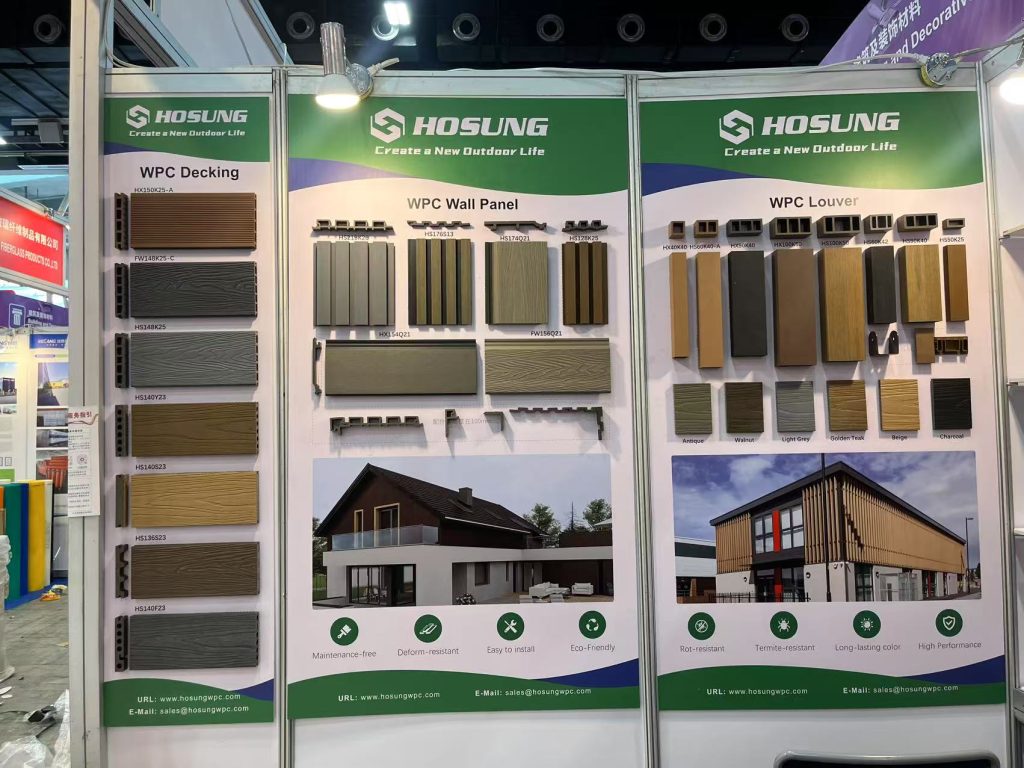
Conclusion: Make a Statement with Dark Green Composite Decking
If you’re looking for a bold yet natural look that pairs durability with elegance, dark green composite decking may be your ideal choice. It harmonizes with greenery, elevates your outdoor design, and lasts for decades with minimal upkeep.
Whether you’re building a backyard deck, poolside retreat, garden path, or forest hideaway, this unique color brings a sense of grounded luxury. As more homeowners and designers seek color palettes inspired by nature, dark green decking is poised to become a defining trend in outdoor living.
Ready to bring your vision to life? Choose a high-quality, sustainable, and richly colored dark green composite decking product—and let your outdoor space flourish. Welcome to contact Hosung WPC to custom.
FAQs About Dark Green Composite Decking
1. Is dark green composite decking suitable for full-sun areas?
Yes, dark green composite decking is UV-resistant and built to handle exposure to sunlight. However, like all darker decking colors, it may retain slightly more heat than lighter shades. To manage heat buildup, consider partial shading solutions such as pergolas or retractable awnings if your deck is in full-sun zones.
2. Will the dark green color fade over time?
Most high-quality composite decking boards are engineered with fade-resistant color technology, including UV stabilizers. While a slight mellowing may occur over several years, reputable brands ensure the dark green shade remains rich and attractive with minimal color loss.
3. How does dark green composite decking compare to traditional wood in terms of maintenance?
Unlike traditional wood, which requires annual staining, sealing, and frequent cleaning, dark green composite decking is virtually maintenance-free. It only needs occasional washing with soap and water to stay in excellent condition—no painting or sanding required.
4. Can I use dark green composite decking around water features or pools?
Absolutely. Composite decking is moisture-resistant, splinter-free, and slip-resistant, making it ideal for installation around pools, ponds, or water gardens. The dark green hue adds a natural harmony to water-focused landscapes without clashing with stone or plant life.
5. Will dark green decking boards show dirt or leaves more than other colors?
In fact, dark green often hides debris better than black or light grey decking. Its earthy tone blends well with organic materials like leaves, pollen, or garden soil, which makes it a practical choice for tree-covered or heavily planted outdoor areas.
6. Is dark green composite decking environmentally friendly?
Yes. Most composite decking products are made using recycled wood fibers and plastics, reducing the need for deforestation and landfill waste. Choosing dark green decking supports sustainability without sacrificing beauty or performance.

